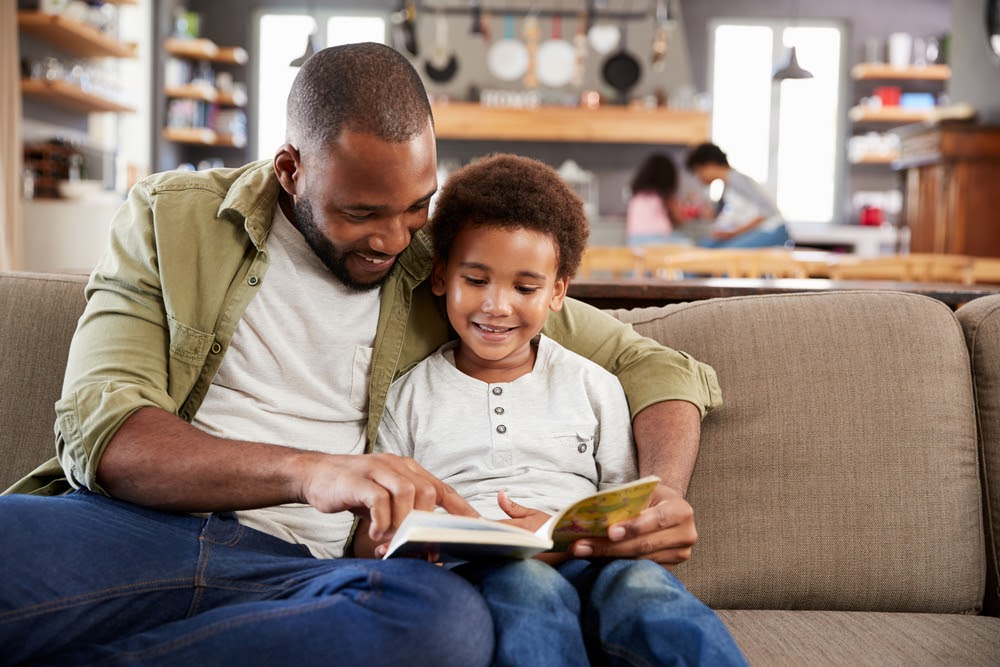
As children progress with their reading skills, they may be interested in grabbing bigger books from the library or off bookshelves at home. Chapter books can be found for different reading levels, interests and age groups.
Some children may begin reading chapter books earlier than others. Some second graders or even first graders may be drawn to these longer stories. Parents may wonder: “How do I help my 2nd grader read chapter books?”
The more appropriate question that parents should ask is if their second grader is READY to read chapter books. Not every child is ready to grab a longer book; some children may be perfectly happy with shorter stories.
Here are a few points to consider when parents want to encourage their child to read chapter books.
The Parenting Pressure Problem
Parents might see other children in their child’s class reading chapter books. Or maybe an older sibling started reading chapter books at a young age. The parenting pressure problem can be a real problem; it involves parents who might be comparing their child to another child and making expectations that might not be appropriate.
Children develop differently. Some children read at an early age. Maybe words and books just interested them. Perhaps decoding words just comes naturally. There are many reasons why children read at a young age or pick up literacy skills easily.
Other children may struggle. Or they may just not love reading. Maybe there are underlying learning difficulties that make reading more of a struggle. Perhaps a child just hasn’t discovered a book that truly resonates with them.
Parents can’t necessarily expect a child to read chapter books too soon simply because a sibling read longer books at a young age or even because a child’s friend has graduated to chapter books. Not every child is ready to tackle longer books.
However, parents could encourage children to read longer books if and when they are expressing interest. If they do see their friend reading a longer book, they might want to start reading that same book.
Parents also should know their child’s reading level and abilities. Is their child reading fluently? Are they reading at grade level?
If a child is behind their peers, this doesn’t mean that chapter books are off the table. But parents should be cognizant in helping them choose books that aren’t too hard or beyond their reading level. Reading a book that is too difficult could just lead to frustration.

Helping a 2nd Grader Read Chapter Books
Reading a chapter book for the first time could be quite an undertaking for a second grader. Some might find the length of a chapter book overwhelming. Here are a few ways that parents can help their second grader undertake reading that first chapter book:
- Encourage children to read a chapter at a time.
- Use reading comprehension bookmarks to help children think about the story as they read…and, of course, to mark their page! These bookmarks can be made at home. Parents can write prompts related to ‘wh’ questions on the child’s bookmark.
- Let children choose their own chapter books.
- Make sure chapter books are at the appropriate reading level.
- Choose shorter chapter books to help ease children into reading these lengthier stories.
- Talk about the book with children.
Reading Chapter Books during Story Time
While children may be ready and eager to read chapter books in second grade, parents can read these longer books aloud to even preschool age children.
These books can help broaden a child’s exposure to more robust vocabulary. In addition, Scholastic explains that the more complex story helps build children’s inferential reading skills.
For younger children, parents may want to consider topics and stories that will hold their child’s attention and keep them engaged and interested. Does the child love unicorns? Find chapter books focused on these fantasy creatures.
Reading chapter books aloud to children during evening story time also could get them more excited to read again. Maybe parents only read one chapter at a time. Then they talk about what just happened with their child…or talk about what might happen. Reading these stories chapter by chapter could help build excitement and anticipation for the next part of the adventure.
Choosing Appropriate Chapter Books for a 2nd Grader
When parents understand their child’s reading level, they can better help their child choose chapter books that are appropriate. However, finding appropriate books also requires parents to understand content, too.
Some children read above their grade level. While a book could be within their reading level, the content of the book—like the story plot or even the dialogue—could be beyond a child’s emotional understanding.
For example, some books read in high school may feature an easy reading level but more abstract plot elements or even more mature concepts, dialogue or themes. So how do parents know if the content is appropriate?
Every parent has their own level of comfort related to what defines appropriate content. Some parents let their child read whatever they wish to read. Others may be very thorough in researching plots or details about the book.
Parents should use their own personal judgment in helping their child find the best books for their reading level and emotional maturity. Parents don’t want their child becoming fearful because of a book or confused because they simply don’t understand what they are reading.
Here’s how to help children find the best books for beginning reading journey in chapters:
- Understand the child’s reading level. Make sure books fall within this range.
- Have children make an interest list that includes topics, characters, genres they wish to read.
- Check out book lists that feature recommendations for children by age/grade.
- Visit the library and let the child explore their options.
- Introduce children to books by favorite authors from the parent’s childhood…some children’s authors are simply timeless!
Helping a Struggling Reader
Some second graders might see their friends reading chapter books but feel frustrated because the child struggles with reading. How can parents help a struggling reader prepare to read chapter books?
Again, a child needs to be ready to delve into chapter books. Helping a child gain confidence and proficiency might help them prepare to read lengthier stories. Parents can help children read at home with reading apps or programs like Readability.
Whether a child struggles with comprehension or reading fluency, Readability’s built-in AI tutor can help guide them and help them read with confidence. Readability’s AI tutor features voice-recognition software that can identify each child’s unique voice; this helps the tutor understand when a child needs help.
The tutor also will test a child’s understanding of the story by asking questions after the end of each lesson. Children who display proficiency in fluency and comprehension can move to a more difficult reading level. Some children, though, may take more time to advance…every child has different challenges and struggles.
Readability keeps children engaged and excited to read. Stories feature colorful illustrations, and children can discover the meaning of new words with just a click. Readability’s authors create stories that children want to read and that get children excited to read more…stories aren’t too easy or too difficult and they are both age and reading level appropriate.
Readability can help children gain confidence reading aloud. Using Readability could help children boost their reading level and feel ready to tackle longer books.
Parents can sign up for Readability to explore the features with their child…for free! Readability offers a seven-day trial period to help parents discover if Readability’s AI tutor is right for their child. Sign up today to explore Readability and begin lessons with a unique virtual reading tutor!

 Español
Español